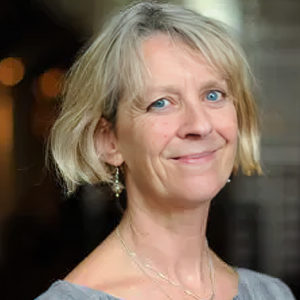
Prof. Ellen Annandale
University of York
Ellen is chairperson of the board of trustees. Ellen’s main research interests lie in the sociology of health and illness and the sociology of gender, and especially the connections these two fields, This is reflected, for example, in her most recent single authored books, Women’s Health and Social Change (Routledge, 2009) which was shortlisted for the BSA Sociology of Health and Illness Book Prize and the 2nd edition of The Sociology of Health and Medicine (Polity, 2014) which was Highly Commened in the 2015 BMA Book Awards.

Prof. Rose Barbour
Open University
Rose Barbour is treasurer of the board of trustees. Rose is emerita professor at the Open University. She has carried out research into a variety of topics, including the roles and responsibilities of midwives, the demands of HIV/AIDS-related work, and the views and professional practice of GPs, mental health, reproductive health and childcare practitioners.
She has a particular interest in qualitative methods. This has resulted in a large body of methodological publications in journals spanning a number of specialist fields.

Dr. Jenny Douglas
Open University
Dr Jenny Douglas is passionate about the health and wellbeing of black women as evidenced through her research and public engagement. She has a PhD in Women’s Studies and completed her doctoral thesis on cigarette smoking and identity among African-Caribbean young women in contemporary British society. This research brought together two divergent research traditions: medical public health and health promotion approaches with sociological approaches to researching cigarette smoking. This interdisciplinary research approach brings together sociology, public health and women’s studies. Her commitment to comparative approaches finds expression not only in working across disciplinary and national boundaries, but also across theoretical and methodological traditions. Her research is both varied and wide ranging spanning 30 years on issues of race, health, gender and ethnicity. The key theme unifying her research and activism is intersectionality – exploring how ‘race’, class and gender affect particular aspects of African – Caribbean women’s health.

Prof. Judith Green
University of Exeter
Judith Green is lead assessor for the Symposium/Workshop awards and the Research Grant Development awards. Judith is a sociologist of health, with a focus on public health, mobility, risk and methodology. She is currently Centre Director of the Wellcome Centre for Cultures & Environments of Health.
Before joining the University of Exeter in 2020, she held posts in King’s College London (1998-91; 2016-20), the London School of Hygiene & Tropical Medicine (2006-20), and London South Bank University (1993-96).
She co-edits the journal Critical Public Health, and co-authors the text book Qualitative Methods for Health Research (Sage). Current academic citizenship includes being a Trustee of the Foundation for Sociology of Health and Illness, and a member of the NIHR Public Health Research funding panel.

Prof. Stephani Hatch
King's College London
Stephani Hatch is lead assessor for the Postgraduate Student International Conference Travel awards. Stephani is the Vice Dean for Culture, Diversity & Inclusion and a Professor of Sociology and Epidemiology at the Institute of Psychiatry, Psychology & Neuroscience, King’s College London. Stephani leads the Health Inequalities Research Group; an interdisciplinary research programme and public engagement activities focused on urban mental health; inequalities in mental health and health services; discrimination; and young adult mental health. The group is supported by Wellcome, the Economic and Social Research Council, and Impact on Urban Health, part of Guy’s and St Thomas’ Foundation.

Prof. Tiago Moreira
Durham University
Originally from Lisboa (Portugal), Tiago came to Britain to study for a postgraduate degree, planning to stay for 9 months only. He ended up doing a PhD and before coming to Durham University in 2006, he was a social researcher at the Centre for Health Services Research at Newcastle University (2002-2006).

Prof. Ewen Speed
University of Essex
Ewen Speed is lead assessor for the Mildred Blaxter Post-doctoral fellowships. Ewen is Professor of Medical Sociology in the School of Health and Social Care at the University of Essex. He has research interests in critical approaches to understanding engagement and involvement in healthcare, as well as processes of involvement in practice for policy users. He also has an interest in the politics of health policy, particularly in the context of the NHS.

Prof. Justin Waring
University of Birmingham
Justin Waring is secretary to the board of trustees. Justin is Professor of Medical Sociology and Healthcare Organisation at the Health Services Management Centre, University of Birmingham. His research deals with the changing organisation and management of healthcare, and public services more broadly. His primary interest is to understand how new organisational forms and processes interact with institutionalised professional practices, cultures and identitites; and how such institutional influences can both stimulate or stymie reform. He is interested in the application of social theory to different social, cultural and organisational contexts, as a means of both explaining social phenomena and extending theoretical rigour. The conceptual and theoretical foundations of his work involves making connections between medical and organisational sociology, sociology of the professions and public services management. He specialises in the use of ethnographic and mixed method research techniques.

Prof. Sue Ziebland
University of Oxford
Sue’s background is in medical sociology, with particular focus on qualitative research approaches. Sue has worked as a researcher in the academic, NHS and voluntary sectors and has published over 200 papers and chapters in social science and health publications. Sue was invited (by Ann McPherson) to be involved in the DIPEx (now Healthtalk ) project in 1999 when it was still at the kitchen table stage. She spent a considerable (and perhaps not surprising) amount of 1999 getting the projects through a national research ethics committee. Since then Sue has worked closely with colleagues in MS&HERG and the DIPEx charity to develop the methods used in the projects and raise funding for the research.
